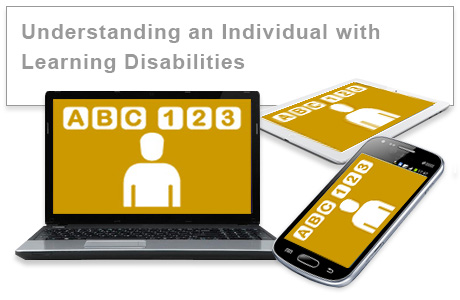understanding-individual-learning-disabilities-f
Understanding an Individual with Learning Disabilities (F): e-learning training course

This e-learning course, Understanding an Individual with Learning Disabilities, is broken down into four easy-to-follow units - an introduction and three study units. Using case studies and interviews, it will provide learners with a better understanding of the rights of people with learning disabilities as well as how attitudes to their support have changed.
The course highlights some of the issues that affect people with learning disabilities, for example in relation to communication, and will enable learners to help the people they support to tackle some of these issues should they arise.
Unit 2 reinforce understanding of the rights of people with learning disabilities and looks at the legislation and policies in place to promote these rights and to encourage inclusion. Learners will be asked to consider how some of the laws and policies apply in their workplace. The unit then goes on to explain the basic principles of advocacy and empowerment.
Unit 3 explores how attitudes to people with learning disabilities have changed over the years and the effect this has had on the support available today. Learners will read some examples of how changing attitudes have had an impact on people and will also
look at who is involved in a person’s support network and identify their roles. The unit
concludes by considering how diagnosing, and therefore ‘labelling’, people can have
negative as well as positive outcomes.
Unit 4 illustrates the importance of developing good communication techniques with each service user which are geared towards their abilities. It also looks at some of the barriers to communication and suggests ways of overcoming them. The unit goes on to clarify the term 'learning disability' and break down some of the misconceptions relating to it. Learners will look at the social and medical models of disability and how they fit with today's attitudes. The course concludes by looking at the topic from another point of view - that of the carer - and the support available for them.
The objectives for each study unit are that learners will be able to:
- understand the rights of people with learning disabilities
- describe how legislation and policies protect the rights of people they support
- explain why inclusion is very important for people with learning disabilities
- identify the basic principles of advocacy and empowerment
- understand how support for people with learning disabilities has changed over the years
- identify how past attitudes have had an impact on the support available today
- list the people involved in a person's support network and what they do
- explain why stereotyping can be harmful
- understand the importance of learning to communicate well with each service user
- recognise some of the barriers to communication and suggest ways to overcome them
- define the term 'learning disability'
- explain what the social and medical models of disability are
- identify sources of support and advice for carers.
Copyright Notice | Terms and Conditions | Privacy Statement | Disclaimer |
Copyright © 2006 - 2024 Embrace Learning Ltd.